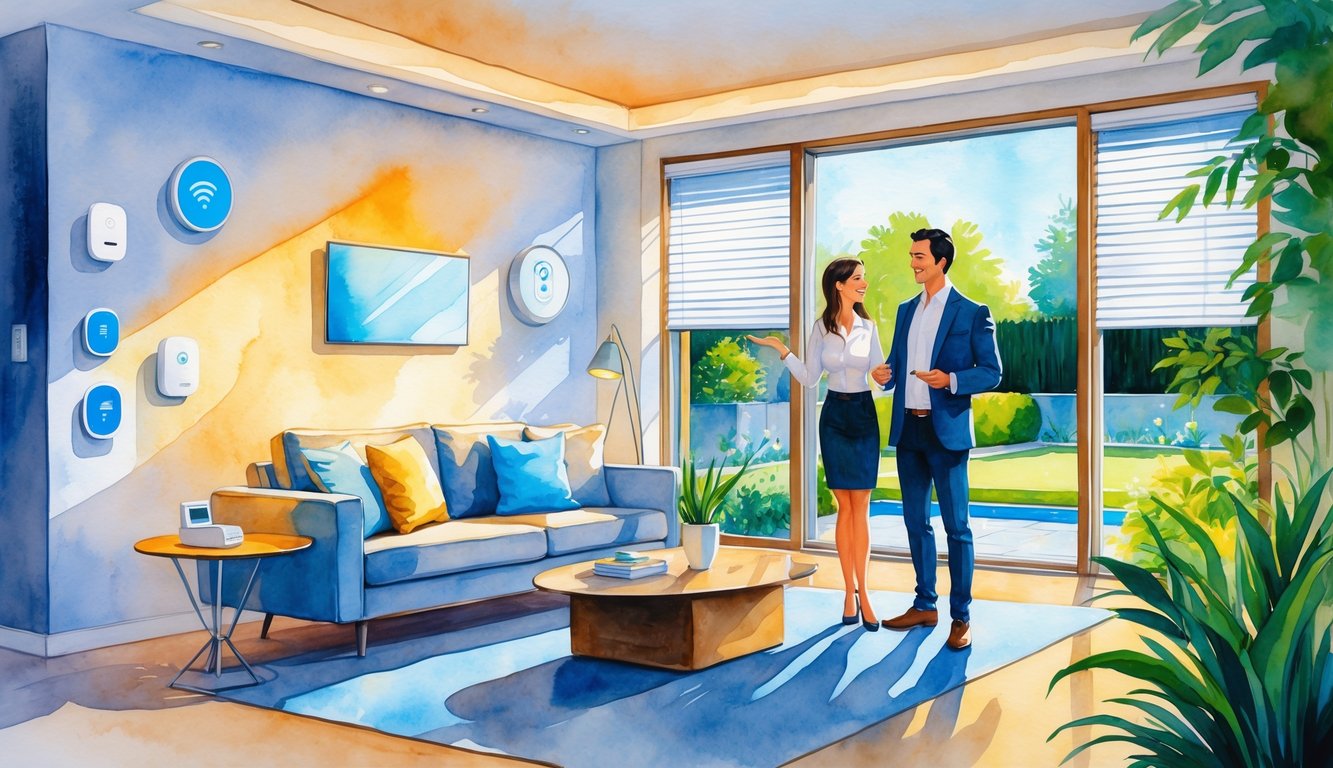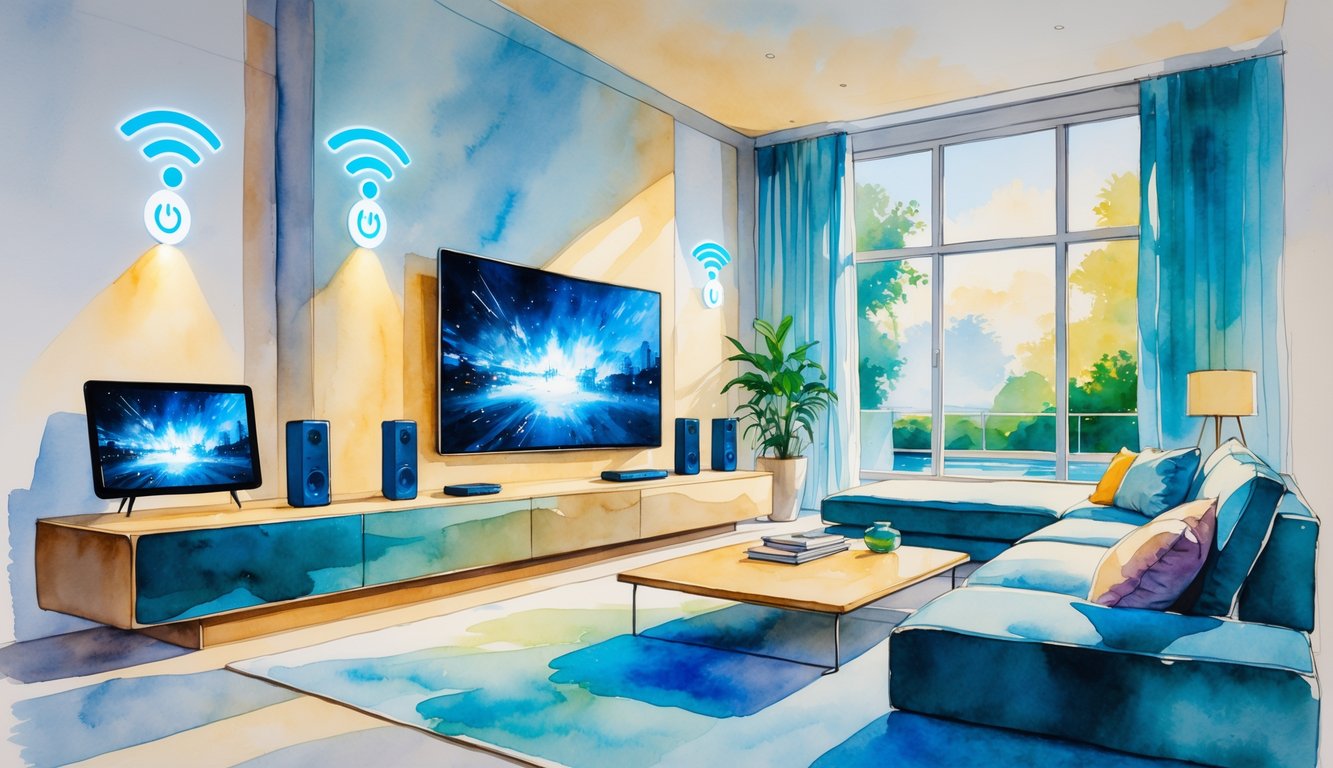
Energy Efficiency and Environmental Impact
Every open house lately—someone always asks if smart thermostats or solar panels are just marketing. Is it a scam? Not really, but it’s not “free power forever” either. The conversation’s changed—nobody cares about fancy lighting if the energy bills suck.
Energy Savings from Smart Home Features
Trying to remember when a smart thermostat actually saved me money. Oh, right—two houses ago, the Nest. HVAC dropped by 15%. I checked old bills, just to be sure. Felt weirdly proud. Realtors keep saying “energy savings” like it’s magic, but what matters is real, verified cuts and maybe a little less climate guilt.
For what it’s worth, homes with smart energy features sell faster. Not my opinion—actual analytics. Even NAR says homes with smart security and energy-efficient appliances can sell up to 10% quicker. I’ve seen sellers upgrade to smart lights or Energy Star appliances and get most of it back in the sale price, but don’t expect a perfect return.
Thermostats set routines, motion lights turn off when you leave, those little tricks add up—maybe $200-400 a year, based on what I’ve seen and heard. But sometimes, everything glitches and you end up arguing with a blinking wall device instead.
Smart Irrigation and Automated Blinds
Irrigation controllers that check the weather—why didn’t sprinklers always do this? First time I set up app-controlled sprinklers, I wasted an hour watching the “calibrate” wheel spin, but after that: water savings were real. One suburban yard, 30% less water the first summer with Rachio.
Nobody cares about automated blinds until a heatwave hits. Then it’s “Alexa, close the blinds” on repeat. Had a client who cut 20% off summer AC bills just by scheduling blackout shades. He sent screenshots. These upgrades aren’t theory—they save money, cut waste, keep rooms cooler without touching the thermostat.
But don’t get me started on the time my blinds jammed halfway during a thunderstorm—motor froze, shades lopsided, total mess. The tech’s getting better. Agents swear these energy-efficient perks—automated schedules, responsive systems—are already making buyers move faster. Industry articles point out the lower carbon footprint for homes with smart automation.
Solar Panels and Green Solutions
“Are panels worth it?”—I get this every week, like I moonlight as an installer. Up-front costs? High. But homes with solar and battery storage pull in buyers who want utility independence. There’s hype, but my clients with solar almost always send me screenshots of $10 electric bills, half bragging, half cursing the paperwork.
Beyond cost, it’s resale. Energy-efficient homes with solar are cheaper to maintain, so “green” buyers pounce. Smart grids, backup batteries, panel integration—they’re everywhere now, not just in the fancy neighborhoods. Utility companies sometimes fight buyback credits (why?), but for long-term owners, the environmental impact is huge.
Side note—saw a $500 mistake on a solar quote because someone mixed up kilowatts and kilowatt-hours. Double-check those contracts. Smart energy upgrades are making listings stand out for eco-focused buyers, especially as green stuff becomes normal in the suburbs.
Entertainment and Connected Living Spaces

All those wires behind my TV—why did we ever bother? Buyers go blank staring at setups with smart TVs, connected speakers, and a pile of mystery black boxes nobody wants to untangle, even if they’re worth thousands. Honestly, being able to control streaming, lighting, and music from the couch gets more buyer attention than any granite countertop I’ve ever sold.
Smart TVs and Entertainment Hubs
Honestly, does anyone even know where their coax cable is anymore? Smart TVs just kind of stormed in and took over. I still get people pointing at some absurdly big Samsung and asking in this hushed voice, “Does it do Netflix without a box?” Like, yes, it does, and no, I don’t know how it works, it just does. The list of features is ridiculous—streaming built in, voice assistants, game modes, whatever the latest buzzword is. It’s like your living room is trying to impress a tech reviewer.
Saw a guy last week who said his whole house runs off a Google Nest Hub. Zero remotes. Overkill? Probably, but then he dimmed the Philips Hue lights and started Stranger Things without even moving, so maybe it’s genius. I skimmed some 2025 Vivint market report that claims smart homes are nearly double the price of regular ones. That’s wild. People want streaming, automation, app handoff—all the stuff that sounds cool until you’re stuck resetting a WiFi password at 2 a.m. Old-school folks mumble about privacy, but let’s be honest, most buyers just want their gadgets to work.
But, yeah, sometimes even the “smart” part is dumb. People get lost trying to find the power button or end up connecting their TV to the neighbor’s camera feed. Not kidding. Everyone wants things to be “easy,” but nobody seems to agree on what “easy” actually means.
Multi-Room Audio and Built-In Speakers
Let’s talk about multi-room audio. Either it’s the best thing since sliced bread or it’s a nightmare if you love silence. Walk into an open house and people are poking Sonos speakers in the ceiling, asking, “Will this play in the garage? What about the bathroom?” Shower karaoke is real, by the way. Buyers want zoned control, alarms that don’t blast everyone awake, Alexa or Nest handoff, all that jazz.
Here’s the weird part: built-in speaker systems with multi-zone setups seem to tip the scales more than curb appeal. I don’t get it either. Some folks roll their eyes at surround sound but light up when they realize they can blast classical in the study and podcasts in the kitchen. Total contradiction, but that’s what the Conventus industry trend report says—connected tech sells houses faster.
I’ve lost count of how many times I’ve explained the difference between “wired” and “built-in” speakers. Sellers drop cash on old-school setups, and buyers just want Spotify sync. There’s always someone complaining: “What if I hate music?” Honestly? Sell them on the lighting—Philips Hue can make Jersey feel like a Brooklyn speakeasy if you squint.